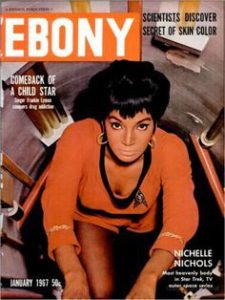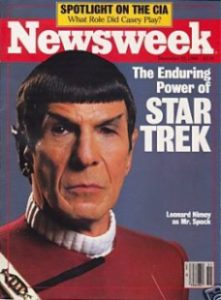On September 8, 1966, NBC premiered a science fiction series called Star Trek. Although it only lasted three seasons in its original iteration, that series has spawned hundreds of hours of television and movies, and in the process offered an inclusive and exciting vision of the future. Suffice to say, one would be hard pressed to write a cultural history of the United States since 1960 without talking about Star Trek and what it represented to the American public. The influence of Trek is also felt in the scholarly world, where numerous collections on Star Trek, and science fiction more broadly, have been a staple of cultural studies anthologies for years. And in regards to intellectual history, Star Trek is part of the zeitgeist of late twentieth century America, as much a part of it as discussion of nuclear weapons, rock and roll, or the Culture Wars (and most often than not, tied to those as well).
Publications such as Ebony talked up the show, while Life magazine used it as a comic prop in a much larger essay on the general state of television in 1969. Those are but two small examples of the popular culture role of Trek. This cannot be separated from the Space Race of the 1960s, the Vietnam War, and the Civil Rights/Black Power  Movements in the United States. All of them, in some way, fed into the story of Star Trek, both on screen and behind the scenes. Some of this you probably know about, even if you’re not a fan of the Original Series: Trek’s take on racism, fear of Cold War escalation, and an overall optimism about the future of humanity permeated the show.
Movements in the United States. All of them, in some way, fed into the story of Star Trek, both on screen and behind the scenes. Some of this you probably know about, even if you’re not a fan of the Original Series: Trek’s take on racism, fear of Cold War escalation, and an overall optimism about the future of humanity permeated the show.
Of course, Trek is also known as being an inspiration for people of all ages. Whoopi Goldberg’s story of being inspired by the portrayal of Lt. Uhura by Nichelle Nichols is one example—but then so is the lesson of astronaut Ronald McNair, who claimed to have been inspired by Star Trek in the late 1960s, when there were no African American astronauts yet sent into space by NASA. And I have to admit, on a personal level, to being inspired by Star Trek when I dreamed of being an astronaut at a young age.
Scholars have also taken up thinking about Star Trek, and what the series and its various spinoffs say about American society. Taking a brief glance at the list of books and edited collections about Trek only scratches the surface. Books on Star Trek and politics, philosophy, economics, and technology are plentiful. And then there are scholarly essays on Trek—our own Mike O’Connor has a fascinating piece titled “Liberals in Space: the  1960s Politics of Star Trek” in Sixties: A Journal of History, Politics, and Culture. Popular publications such as The Federalist have read Star Trek as a symbol of modern liberalism (cross-posting an essay from The Claremont Review of Books). A popular podcast, “Meta Treks,” has even taken up how Trek has taken on history versus memory.
1960s Politics of Star Trek” in Sixties: A Journal of History, Politics, and Culture. Popular publications such as The Federalist have read Star Trek as a symbol of modern liberalism (cross-posting an essay from The Claremont Review of Books). A popular podcast, “Meta Treks,” has even taken up how Trek has taken on history versus memory.
Here, of course, we’ve covered Star Trek more than once. And with the fiftieth anniversary of the first episode (“The Man Trap”) coming up later this week, don’t be surprised if you see more essays here at the blog about Trek this week.

7 Thoughts on this Post
S-USIH Comment Policy
We ask that those who participate in the discussions generated in the Comments section do so with the same decorum as they would in any other academic setting or context. Since the USIH bloggers write under our real names, we would prefer that our commenters also identify themselves by their real name. As our primary goal is to stimulate and engage in fruitful and productive discussion, ad hominem attacks (personal or professional), unnecessary insults, and/or mean-spiritedness have no place in the USIH Blog’s Comments section. Therefore, we reserve the right to remove any comments that contain any of the above and/or are not intended to further the discussion of the topic of the post. We welcome suggestions for corrections to any of our posts. As the official blog of the Society of US Intellectual History, we hope to foster a diverse community of scholars and readers who engage with one another in discussions of US intellectual history, broadly understood.
I would argue that of all the Star Trek iterations, only The Original Series (TOS) and The Next Generation (TNG) have had and will have lasting cultural impact, and the former more than the latter.
TOS was truly groundbreaking in its exploration of race, particularly its multiethnic crew, the famous interracial kiss between Uhura and Kirk, and the episode with the race of half black half white aliens. Its commentary on the Cold War was also interesting (Star Trek VI especially at the Cold War’s end). Spock’s grappling of logic vs emotions was also powerful. However, if you rewatch TOS now, you’ll notice the sexism running through the show is truly staggering.
TNG was actually a more cerebral show, and I think a few aliens and themes have made their mark: Klingon honour, Data’s quest to be human, and especially the Borg in relation to the concept of assimilation. Individual episodes, such as the one with aliens who have no gender, also helped push intellectual boundaries.
Also TNG was less sexist (albeit still quite sexist), it again featured a multiethnic crew, and some truly superb actors (mainly Patrick Stewart and Brent Spiner and periodically Whoopi Goldberg, but Michael Dorn was very good too. LeVar Burton is a terrific actor but sadly had the most boring character).
But still I don’t think the characters and stories of TNG had the impact of TOS, even though TNG is clearly the better show. TNG also had one really superb movie, First Contact, but that won’t have the impact of the TOS movies, especially 2, 4, and 6.
Admittedly, I’ve only seen a handful of episodes of DS9 and Voyager, and none of Enterprise, but I don’t think any of those series will have any significant cultural impact, nor will any of the recent movies featuring new version of TOS characters. They will simply be coda to TOS and TNG. The new series, filming now in Toronto, might be excellent, but I can’t imagine it having the same impact as well.
Long way of saying that I think future intellectual historians will write about TOS and TNG but not the other iterations.
I think I would disagree–to an extent. You’re right that, for the moment, TOS and TNG are more culturally relevant, but I believe DS9 and Voyager are both important for certain reasons. DS9’s casting of Avery Brooks as Ben Sisko was the first time a Trek show featured an African American–or any person of color–as the series lead. That in itself was significant, but I also believe future scholars will look at the ways in which Sisko’s blackness was portrayed on the show in a 1990s contexts as particularly important. Also, its dealings with how a democracy survives during wartime (dealt with in seasons 4 through 7), the relationship between science and religion, ideas of the frontier–these are all some of the topics that come to mind when considering the legacy of DS9. Cultural studies scholars are already writing about this–in books such as “The Politics of Star Trek” by George A. Gonzalez.
I would also say this is the same with Voyager–Kate Mulgrew as the first woman as series lead in Trek was equally important to that of Brooks as the first African American. In some ways, the impact of both culturally is hard to quantify, but I think it’s there if you look at, for example, Star Trek fandom in the present day. Or even more broadly, arguments about how diverse science fiction should be in 2016. Enterprise might be a different story, but Discovery (the new series) will be important precisely because Bryan Fuller–the series runner–has already made it clear the show will reflect modern ideas of diversity as well as ripped from the headlines stories.
All that’s to say, in a roundabout fashion, that I believe future historians will write about those shows. But at the same time, it is understandable that TOS and TNG will, potentially, be written about more. The media environment TOS existed in back in the late 1960s means that it was going to have a greater cultural impact than most shows produced in the present day, or even in the 1980s and 1990s.
I’d add that DS9, to me, is a fascinating and sensitive meditation on the human legacies of war crimes. In an early episode, Duet (perhaps the best stand-alone episode of the show), a Cardassian clerk and a Bajoran freedom fighter struggle to process together a horrific genocide that neither of them was able to stop. Later seasons explored the role of sexual violence in wars of conquest and, still later, the show considered the roles of religious extremism and quasi-governmental sabotage in making wars inhumane. It is truly the best of the Trek shows, in my view, and one that is particularly fruitful for intellectual engagement.
I’ve been meaning to give DS9 and Voyager another try. I never could get into them in their initial runs. I actually disliked DS9 precisely for the reason that Jeremy Young seemed to like it, namely, that it negated the classic Roddenberry optimism of TOS and TNG. This makes sense as Roddenberry was not involved in DS9 and died I think just before it began. TNG was especially good at maintaining that optimism while still grappling with serious issues (like Picard’s speech in “The Measure of Man”… “to seek out new life, well there it sits!”) I also liked that TOS and TNG offered almost exclusively standalone episodes, while DS9 eventually turned into a more serial type show (I don’t know if Voyager did this).
I think that TOS and TNG also really brought into being the notion of the Trekkie, of the Star Trek convention, of the special kind of uber-fan we see at Comic-con and elsewhere. That may have as much of an impact as the content of the shows.
Still you have convinced me to move DS9 and Voyager higher up on my list of shows to watch.
After sleeping on the provocative argument you raised above, I think you still made some wonderful points about why TOS and TNG will be culturally relevant for so long. But it’s definitely difficult to say how DS9 will be received years and decades from now! You should definitely check out DS9. I think in some ways it would have fit in perfectly with today’s media environment.
Very lovely article. I always find fascinating how media shapes culture.
Thanks for the kind words! And Jeremy, I’m glad you also brought up that episode from DS9, it’s one of the prime examples of why that series was important.